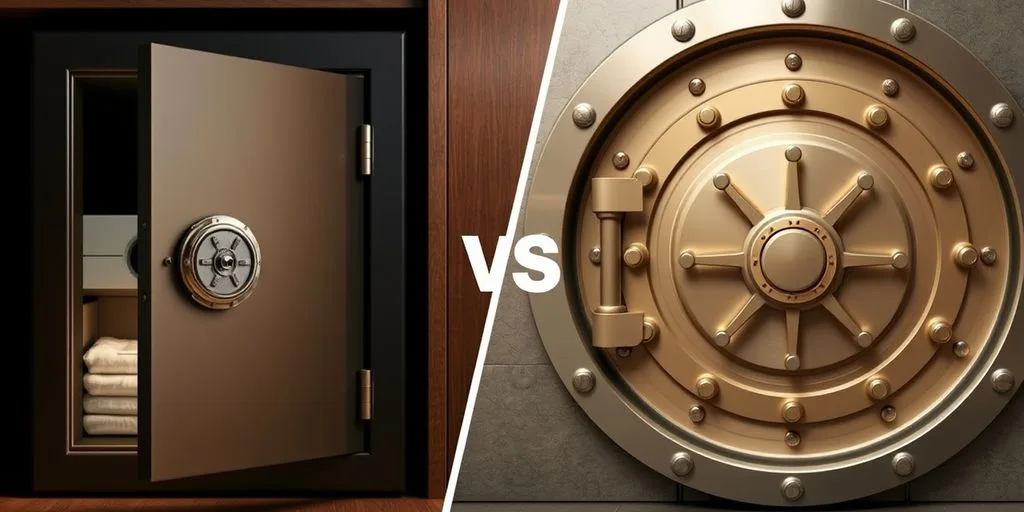Gold is a valuable asset that requires careful storage to maintain its worth and security. Whether you choose to store it at home or in a bank vault, each option has its own set of advantages and challenges. This article will guide you through the different methods of gold storage and help you decide the best option for your needs.
Key Takeaways
- Proper gold storage is essential to protect your investment and ensure its long-term value.
- Home storage offers immediate access but comes with higher risks of theft and damage.
- Bank vaults provide high-level security but limit your access to bank hours and may involve additional costs.
- Private vaults offer a balance of security and accessibility, often including insurance coverage.
- Your choice of gold storage should depend on your personal needs, security concerns, and budget.
Understanding the Importance of Gold Storage

Why Gold Storage Matters
Gold storage is crucial for several reasons. Proper storage protects your gold from damage and loss, ensuring it remains a valuable long-term investment. Additionally, secure storage shields your gold from economic instability, making it easily accessible when needed.
Risks of Improper Storage
Improper storage of gold can lead to significant risks. Gold is malleable and can be damaged by exposure to air and moisture, causing it to tarnish and corrode over time. This can reduce its value and make it less appealing as an investment.
Long-term Value Preservation
Storing gold correctly helps preserve its value over the long term. By protecting it from physical damage and theft, you ensure that your investment remains valuable for future generations. Proper storage is essential for maintaining the worth of your gold assets.
Home Storage: Pros and Cons

Advantages of Home Storage
Storing gold at home has several benefits:
- Easy access: When you keep your gold at home, you can get to it whenever you want. This is useful if you need it in an emergency or just want to admire your collection.
- Independence: You don’t have to rely on banks or other companies to keep your gold safe. It’s all up to you.
- Affordability: While you might need to buy a good safe and insurance at first, you can save money over time by not paying storage fees.
- Control: You have full control over how your gold is stored and can make changes whenever you need to.
Challenges and Risks
However, there are also some downsides to keeping gold at home:
- Larger upfront investment: You might need to spend a lot of money at first to buy a secure vault or safe and get insurance.
- Security risks: Keeping gold at home can be risky because of theft or damage. You need to plan carefully to keep it safe.
- Risk of loss: Sometimes, people hide their gold so well that they can’t find it later. Be careful not to hide it too well.
- Harder to sell: Selling gold stored at home can be tricky. You need to find a trusted store, and they will need to check and value your gold, which takes time.
Best Practices for Home Storage
To store gold at home safely, follow these tips:
- Invest in a high-quality safe that is both fireproof and waterproof.
- Get insurance to cover the value of your gold.
- Keep the location of your gold a secret and avoid telling too many people.
- Consider splitting your gold between multiple safes to reduce the risk of losing everything if one is stolen.
- Regularly check on your gold to make sure it is still safe and in good condition.
Home storage can be a good option if you want easy access to your gold and don’t want to rely on third parties. However, it comes with its own set of risks and challenges that you need to carefully consider.
Bank Vaults and Safe Deposit Boxes
Security Features of Bank Vaults
Bank vaults are known for their high security. They are built to withstand various threats, including theft and natural disasters. Banks use advanced security measures such as CCTV, biometric scanners, and alarm systems to protect the contents of their vaults. Additionally, the vaults are often located in secure areas of the bank, adding an extra layer of protection.
Accessibility and Convenience
One of the main benefits of using a bank vault is the convenience it offers. However, access to your safe deposit box is limited to the bank’s operating hours. This can be a drawback if you need to access your gold outside of these hours. Despite this, many people find the trade-off worth it for the added security.
Cost Considerations
The cost of renting a safe deposit box can vary depending on the size of the box and the bank. Here is a table showing the annual rental costs for different banks:
| Bank | Small Box (p.a.) | Medium Box (p.a.) | Large Box (p.a.) |
|---|---|---|---|
| DBS | $261.60 | $359.70 | $501.40 |
| UOB | $256.80 | $321–$363.80 | $449.40-492.20 |
| Singapura Finance | $180 | $180-220 | $240-280 |
| Hong Leong Finance | $200 | $280 | $350 |
While the costs can add up, many people consider it a worthwhile investment for the peace of mind that comes with knowing their gold is stored securely.
Private Vault Storage Solutions
Benefits of Private Vaults
Private vaults offer a high level of security for your gold. These facilities are designed to protect your valuables from theft, fire, and other risks. Many private vaults have advanced security features like CCTV, biometric scanners, and on-site guards. Additionally, private vaults often provide a discreet storage solution, ensuring that only you know the contents of your vault.
Insurance and Security Measures
When you store your gold in a private vault, you can often get insurance coverage for your valuables. This adds an extra layer of protection against potential risks. Some private vaults, like STARVAULT, offer liability protection, but this may come with higher annual fees. It’s important to discuss with the facility what security features they offer, such as continuous CCTV monitoring and alarm systems.
Limitations and Drawbacks
While private vaults offer many benefits, there are some drawbacks to consider. One major limitation is the lack of direct physical access to your gold. Unlike home storage, you can’t just walk up to your vault and retrieve your items. Instead, you may need to schedule a visit or request delivery of your gold. Additionally, the cost of private vault storage can be high, so you’ll need to balance this against the value of your gold investment.
Private vaults provide a secure and discreet way to store your gold, but it’s important to weigh the costs and limitations before making a decision.
Comparing Home Storage and Bank Vaults

Security Comparison
When it comes to security, bank vaults generally offer higher protection compared to home storage. Bank vaults are equipped with advanced security features like CCTV, biometric scanners, and on-site guards. On the other hand, home storage requires you to invest in a high-quality safe and possibly additional security measures like alarm systems.
Cost Analysis
Home storage is often more cost-effective in the long run since there are no recurring fees after the initial setup. However, bank vaults come with annual fees that can add up over time. Here’s a quick comparison:
| Storage Option | Initial Cost | Annual Fees |
|---|---|---|
| Home Storage | High | None |
| Bank Vaults | Low | High |
Accessibility and Convenience
Home storage offers the convenience of immediate access to your gold whenever you need it. In contrast, bank vaults limit access to bank hours, which can be a drawback during emergencies. However, the convenience of not having to worry about home security can be a significant advantage for bank vaults.
Choosing between home storage and bank vaults depends on your personal needs and circumstances. Consider the level of security, cost, and accessibility that best suits your situation.
Making the Right Choice for Your Gold Storage

Assessing Your Needs
Before deciding where to store your gold, it’s important to assess your personal needs. Consider factors like how often you need access to your gold, your budget for storage, and your trust in third-party institutions. If you value immediate access and control, home storage might be more suitable. On the other hand, if you prefer a low-effort solution, a bank vault or private vault could be a better fit.
Evaluating Different Options
When evaluating different storage options, weigh the pros and cons of each. Home storage offers privacy and easy access but comes with risks like theft and damage. Bank vaults provide high security but limit your access. Private vaults offer a balance of security and accessibility but can be costly. Make sure to consider all aspects before making a decision.
Final Considerations
Ultimately, the best storage option depends on your individual circumstances. Think about the level of security you need, the costs involved, and how quickly you might need to access your gold. Proper storage not only preserves the value of your investment but also ensures it stays safe and secure. Choose wisely to protect your valuable asset.
Choosing the best way to store your gold is crucial for protecting your savings. Our Wealth Protection Kit can guide you through the process, ensuring your assets are safe and secure. Don’t wait—visit our website today to request your FREE Wealth Protection Kit and learn how to safeguard your future.
Conclusion
Deciding where to store your gold is a personal choice that depends on your needs and circumstances. Home storage offers immediate access and privacy but comes with risks like theft and the need for proper insurance and security measures. On the other hand, bank vaults and safe deposit boxes provide high security and professional care but limit your access and may involve additional costs. Ultimately, the best storage solution is one that balances your need for security, accessibility, and peace of mind. Choose wisely to ensure your gold remains a safe and valuable investment.
Frequently Asked Questions
Why is storing gold important?
Storing gold properly helps protect its value, keeps it safe from theft or damage, and ensures it remains a valuable long-term investment.
What are the benefits of storing gold at home?
Storing gold at home gives you quick and easy access to it. You also have full control over its security and can keep its location private.
What are the risks of home storage for gold?
Home storage risks include theft, damage, and loss. You need to invest in a good safe and possibly extra insurance to protect your gold.
How secure are bank vaults for gold storage?
Bank vaults are very secure, with advanced security measures like surveillance and controlled access. However, your gold is not insured by the bank, and access is limited to bank hours.
What are private vaults?
Private vaults are storage facilities managed by companies specializing in keeping valuables safe. They offer high security, insurance, and sometimes 24/7 access.
How do I choose the best storage option for my gold?
Consider your needs for accessibility, security, and cost. Home storage offers quick access but requires more personal security measures. Bank vaults and private vaults provide high security but limit access to specific hours.

Alexander is a veteran financial advisor with over 25 years of experience specializing in precious metals and retirement planning. As a Certified Financial Planner (CFP) and former senior analyst at a leading gold investment firm, Alex has guided countless individuals in securing their financial futures through strategic gold investments.

Leave a Reply